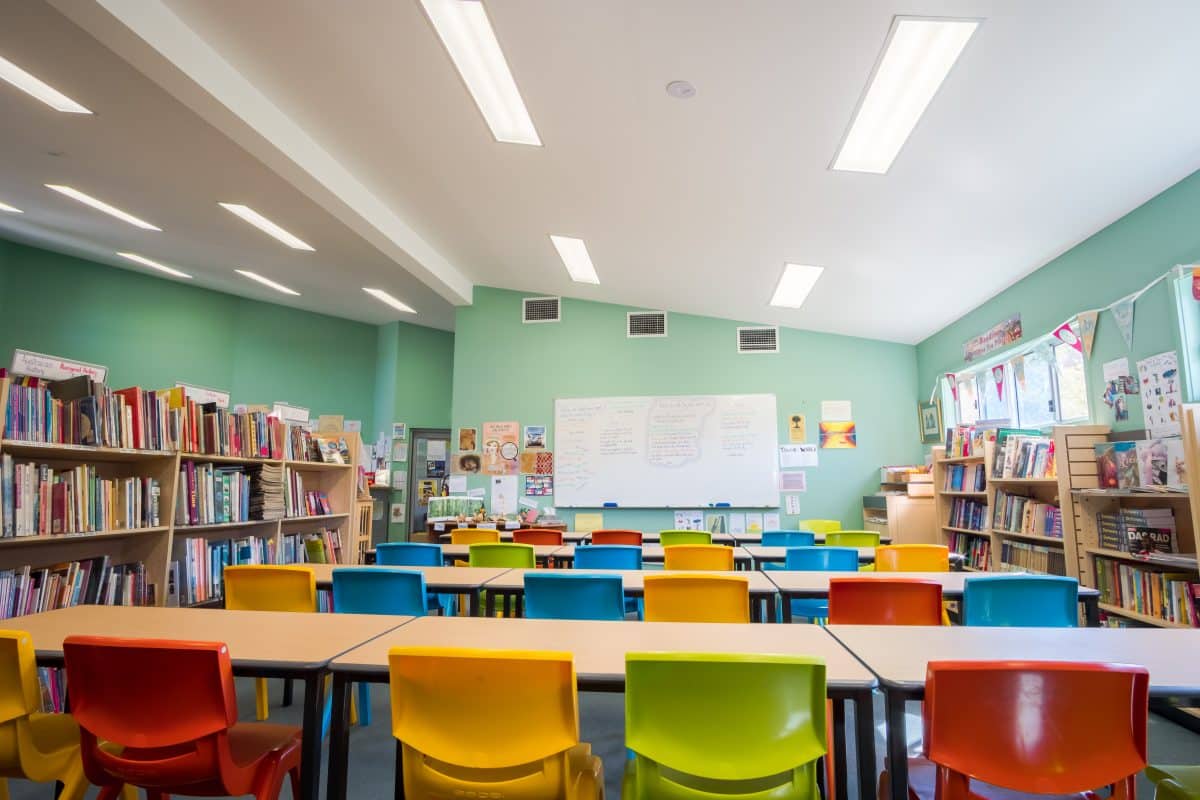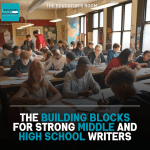Overview:
Having students write for authentic audiences is a way to engage them in becoming stronger writers.
Authentic Audiences: Late one Wednesday morning, my seventh- and eighth-grade multilingual learners with emerging English language skills were emphatically complaining about the amount of writing required of them as we read and answered questions about teenage screen time usage. This work prepared them for an argumentative paragraph assignment on whether kids have too much screen time. The very next day, that same group of students painstakingly, yet eagerly, collaboratively wrote and revised the entire class period without complaint. What changed?
The audience and purpose of their writing task.
While reading about teenage screen usage nationally, my students inquired how their class and students across the school compared to this data. They wanted to create a survey and inform their schoolmates about the results. I agreed wholeheartedly with their suggestions if they would do the work. To them, their writing now had a purpose. No longer were they writing just for me; instead, they were writing for their peers. This seemingly little shift in audience provided a renewed sense of interest and motivation. We educators need to capitalize on this audience shift to help change the trajectory of student writing.
The Evidence
Alarmingly, national data reports that a mere 27% of eighth- and twelfth-grade students are writing at a proficient level (NCES, 2012). Though there are several factors that could explain this, the lack of authentic writing opportunities–or those with real audiences–is an easily changeable practice that can produce significant gains in student writing. I have experienced this in my classroom, and studies support this claim.
One study indicated that seventh-grade students in Jerusalem produced writing with more content, details, greater organization, better mechanics, and improved language use when writing for an external peer audience than when writing a final exam essay solely for their teacher (Cohen & Riel, 1989). A more recent study in the United States produced similar results among primary students. Block and Strachan (2019) found second graders were 22 times more likely to produce higher quality writing when writing for an authentic audience than for their teacher.
This held true in another classroom of mine a few years ago when students wrote letters to their principal arguing whether the district should have snow days or e-learning days. The quality of their writing- in grammar, mechanics, and details- was much higher than what they typically showed me. Yes, they were interested in the topic but were also motivated to get it right, knowing the principal would be reading their letters.
Audience Shifting
Writing is a communicative act, yet we often deny kids the opportunity to communicate with anyone in the real world. It has been ingrained in our student’s minds that they should write solely for their teacher to learn to be a better writer or to show their understanding of content. Through this narrow focus, writing has largely become a decontextualized task within our classroom walls (Cohen & Riel,1989). Outside of school, writing is seldom used to regurgitate knowledge, yet this is the most common form of writing we ask our students to produce (Strachan, 2016). Not only does this have detrimental effects on the quality of student writing, but it also robs students of the ability to consider and modify their writing based on the intended audience- a required skill when communicating in life.
I have also been guilty of providing limited audiences for my students. Ponder for a moment: in a time where the world is at our fingertips, why do we teachers put extra pressure on ourselves to become the arbiters of so many perspectives? We could have students write for real audiences outside of the classroom, providing authentic responses while simultaneously boosting their motivation and quality of writing. I think back to my own experiences in school, where I worked hard on my writing, but I also had a teacher who provided insight, encouragement, and constructive feedback. Upon reflection, I put in extra effort when I was presented with an assignment to submit an essay to a community writing contest. After winning third place, my confidence was bolstered, and I began to envision myself as a writer for the first time.
Classroom Implications
I observed this happening in my own classroom. With a shift in audience, my students were excited about formulating and creating survey questions in written form with proper English sentence structure, grammar, and mechanics. This group of struggling readers and writers began questioning and revising each other’s phrasing and grammar to ensure their surveys were presentable for native English speakers, not just for me. When they could not come up with the answer collectively, they turned to me for guidance. I assured the students I would teach them how to convey their thoughts properly. Rather than being the one imparting my expertise, my primary role became that of an encourager and supporter as students took ownership of their learning.
When students know their work will be read by someone who legitimately wants to read and learn from their writing, they will put forth more effort to produce higher-quality work. Instead of having kids write just to you, have them write to their school superintendents, lawmakers, librarians, newspapers, town council members, pen-pals, peers, or even relatives. Have them submit their research, essays, and poems to journals, websites, companies, or contests. You may need to think outside the box, but I feel the results in student writing will be worth everyone’s time. To help our students become successful writers, we must allow them opportunities to write for real audiences.
Note of Caution
While it is important that we give students authentic writing opportunities, I want to offer a note of caution. Providing these experiences does not mean we can forget about the explicit instruction students need in writing–there is not a magic spell that makes students great writers. However, writing for a real audience provides a new reason to get things right. Vicki Spandel states in her book, The 9 Rights of Every Writer: A Guide for Teachers, “When we teach writing for the right reasons–to help our children write with passion and touch the hearts of readers—the little things tend to fall into place” (2005, pg. xiii). They become intrinsically motivated to learn the skills that will take their writing further than they believed.
Editor’s Note: If you enjoyed this article, please become a supporter by clicking here.

Jackie Hendrickson has been an English language teacher for the last 10 years. She currently teaches multilingual learners in kindergarten- eighth grade in a suburban district of Minnesota but has had the opportunity to teach abroad in Finland. Jackie enjoys singing, painting, and traveling whenever the opportunities arise.
References
Block, M. K., & Strachan, S. L. (2019). The impact of external audience on second graders’ writing quality. Reading Horizons (Online), 58(2), 68-93. https://www.proquest.com/scholarly-journals/impact-external-audience-on-second-graders/docview/2314197810/se-2
Cohen, M., & Riel, M. (1989). The effect of distant audiences on students’ writing. American Educational Research Journal, 26(2), 143–159. https://doi.org/10.3102/00028312026002143
National Center for Education Statistics (NCES). (2012, September). The nation’s report card: Writing 2011. Institute of Education Sciences, U.S. Department of Education. https://nces.ed.gov/nationsreportcard/pdf/main2011/2012470.pdf
Spandel, V. (2005). The 9 rights of every writer: A guide for teachers. Heineman.
Strachan, S. L. (2016). Elementary literacy and social studies integration: An observational study in low- and high-SES classrooms (Order No. 10105795). Available from ProQuest One Academic. (1790623090). https://www.proquest.com/dissertations-theses/elementary-literacy-social-studies-integration/docview/1790623090/se-2





This is a well written, well referenced article. Ive recently read “Readicide” by Kelly Gallagher and the reminders for us to keep authenticity at the fore of our work is never lost on good teachers. Well done.